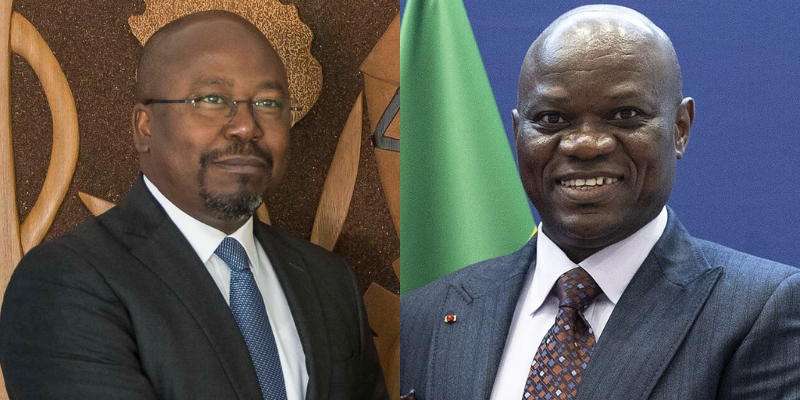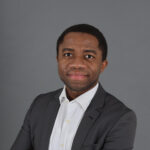
On April 12, people in Gabon will vote for a new president. This election comes on the heels of an August 2023 military coup that ended the 56-year rule of the Bongo family. President Ali Bongo Ondimba was ousted in a coup led by Brigadier General Brice Oligui Nguema, who is a prominent contender in this year’s presidential race. This marks the first presidential election since the coup. For Gabon voters, much of their focus will be on how Oligui Nguema positions himself in Gabon’s post-coup political landscape.
The Bongo family has long been a dominant force in Gabon’s political history. Omar Bongo ruled from 1967 until his death in 2009. His son, Ali Bongo, then governed until the 2023 coup. The August 2023 military takeover followed controversial elections, which many saw as an attempt by the Bongos to extend their grip on power. The coup leaders justified their actions by accusing Ali Bongo of mismanaging the country and governing poorly, creating unrest and dissatisfaction among the population. Although the international community condemned the coup, concerns about transparency and fairness of Gabon’s electoral system have remained a prominent issue.
After being deposed, Ali Bongo withdrew from political life, publicly acknowledging his shortcomings during his presidency. In September 2023, he formally stepped away from politics and called for the release of his wife and son, who had been detained during the coup. The Bongo family’s long hold on power, and the subsequent upheaval, has left Gabon at a crossroads. As voters head to the polls, the future of the nation hinges on how they respond to the challenges of governance, democracy, and the role of the military in politics.
Here are six key things you should know about Gabon’s 2025 elections:
1. Eight candidates, but just two main contenders
Oligui Nguema, age 50, was the leader of the August 2023 coup and is now the primary contender in this year’s presidential race. Oligui Nguema’s candidacy focuses on electoral credibility and ending the Bongo era. He has gained significant support. An endorsement from the Gabonese Democratic Party (PDG), which was formerly led by the Bongo family, has further solidified his position. Oligui Nguema’s primary rival is Alain Claude Bilie-By-Nze, 57, who served as the last prime minister under Ali Bongo.
Other candidates include Stéphane Germain Iloko Boussengui, a former member of the Gabonese Democratic Party who now leads the “Large Rainbow Gathering” movement; and tax inspector Joseph Lapensee Essigone. Gninga Chaning Zenaba, a Gabonese entrepreneur, is the only woman running for president.
Despite being a transitional leader, Oligui Nguema was exempted from the usual rule barring such leaders from running after Gabon’s new constitution was approved by a landslide vote in November 2024. This move has sparked opposition and raised concerns that the military junta may seek to maintain its grip on power.
2. Negative campaigning by opposition candidates
The opposition candidates in Gabon’s 2025 presidential race have launched campaigns targeting the incumbent, Oligui Nguema, and criticizing past Bongo administrations. They argue that the Bongo family’s long-standing rule, coupled with the military’s growing influence, has stifled political freedom and democratic reforms.
Bilie-By-Nze, a former prime minister under Ali Bongo, has positioned himself as a challenger to Oligui Nguema, emphasizing the need for transparency and genuine political change. Similarly, Joseph Lapensee Essigone, who claims to be the candidate of change and unity, is presenting himself as an alternative to the past. He’s calling for an end to the Bongo legacy and a move toward a more inclusive and democratic government.
Despite their efforts to break from the past, the influence of the military and the ongoing political dominance of figures tied to the previous administration raise questions about whether the opposition can truly bring about the change they advocate for – or whether Gabon’s political system will remain largely the same.
3. Gabonese are frustrated about services – and electoral transparency
Many Gabonese are unhappy with the quality of essential services like electricity and water, according to recent Afrobarometer surveys. At the same time, while they support elections, they doubt election fairness and transparency. Citizens are calling for improvements in both public services and the electoral process.
4. The Bongo era and military power in Gabon
The main candidates in the race – coup leader Oligui Nguema and former prime minister Bilie-By-Nze – are both closely connected to the Bongo family, having worked with them during their time in power. Oligui Nguema has also secured crucial backing from the PDG, a party the Bongos once led. While this election could mark the end of the Bongo era, the involvement of these two candidates raises concerns about whether real change is possible, or if the power dynamics will merely shift. Also, Oligui Nguema’s dual role as both a military leader and candidate further complicates the prospect of real change.
5. Will Gabon’s 2025 election be fair?
As Gabonese visit the polling booths, there are concerns over the possibility of an internet shutdown. In the aftermath of the August 2023 elections, a four-day shutdown limited freedom of information. This is part of the toolkit the leader in power can use to silence citizens. The potential for communication restrictions during this election depends heavily on concerns related to security, the spread of misinformation, voter privacy, and the need to safeguard the integrity of the electoral process. Such factors raise doubts about whether the election can be free and fair.
Constitutional changes passed in November 2024 included updates to the electoral commission, and the adoption of an electoral register using biometric technology aimed to improve transparency. But many observers question whether these measures can ensure a free and fair election process.
6. This is an election with regional consequences
Concerns over past electoral fraud and irregularities, particularly in Gabon’s 2016 and 2023 elections, highlight the need for measures to ensure the electoral process is free and fair. Several international observer groups, including the Commonwealth Observer Group, have been deployed to monitor the upcoming vote. These observers will be tasked with evaluating the election process, from voter registration to the counting of votes, to provide an impartial assessment of whether the election is free and fair. However, the presence of election observers alone will not guarantee the election’s integrity.
Of course, past studies about elections and election observers can shed some light. Studies by Joseph Asunka and colleagues, for instance, have shown that observers can help reduce election fraud and violence. But their presence may not eliminate manipulative tactics – and instead displace fraud and violence to areas where observers aren’t present.
The election’s outcome will also have important consequences for neighboring countries. A smooth process could inspire positive political change elsewhere in Central Africa. Instability, on the other hand, could raise concerns for regional governance, security, trade, and diplomatic relations – as well as the upcoming elections in Cameroon, the Central African Republic, and Equatorial Guinea.
Kelechi Amakoh is a 2025-2026 Good Authority fellow.




